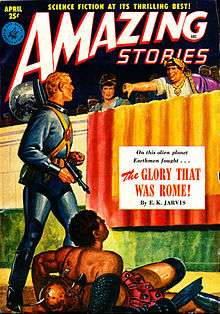Satisfaction Guaranteed (short story)
| "Satisfaction Guaranteed" | |
|---|---|
 | |
| Author | Isaac Asimov |
| Country | United States |
| Language | English |
| Series | Robot series |
| Genre(s) | Science fiction |
| Published in | Amazing Stories |
| Publication type | Periodical |
| Publisher | Ziff Davis |
| Media type | Print (Magazine, Hardback & Paperback) |
| Publication date | April 1951 |
| Preceded by | "Liar!" |
| Followed by | "Lenny" |
"Satisfaction Guaranteed" is a science fiction short story by American writer Isaac Asimov, originally published in the April 1951 issue of Amazing Stories, and included in the collections Earth Is Room Enough (1957), The Rest of the Robots (1964), and The Complete Robot (1982).
Plot summary
Robot TN-3 (also known as Tony) is designed as a humanoid household robot, an attempt by US Robots to get robots accepted in the home. He is placed with Claire Belmont, whose husband works for the company, as an experiment, but she is reluctant to accept him. Tony realizes that Claire has very low self-esteem, and tries to help her by redecorating her house and giving her a make-over. Finally, he pretends to be her lover, and deliberately lets the neighbors see him kissing Claire, thus increasing her self-esteem. In the end, though, Claire falls in love with Tony, and becomes conflicted and ultimately depressed when he is taken back to the lab. The TN-3 robot models are scheduled to be redesigned, since US Robots thinks that they should not produce a model that will appear to fall in love with women. US Robots robopsychologist Susan Calvin dissents, aware that women may nevertheless fall in love with robots.
Adaptations
The story was adapted as an episode of the BBC television series Out of the Unknown with Wendy Craig as Claire.[1] The complete episode is lost, although a 2m 27s extract, the full soundtrack, and off-screen photographs exist.
References
External links
- Satisfaction Guaranteed title listing at the Internet Speculative Fiction Database
| Preceded by: "Liar!" |
Included in: The Rest of the Robots The Complete Robot |
Series: Robot series Foundation Series |
Followed by: "Lenny" |